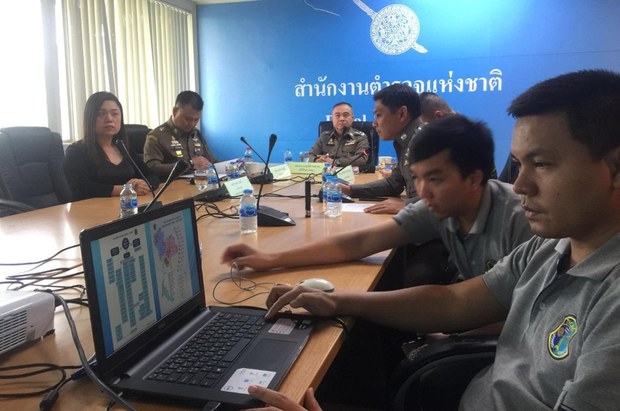Thailand: Task Force Promotes Efforts to Arrest Child-Sex Predators
2018.01.11
Bangkok
 Police Gen. Thammasak Witcharaya, (center), chief of Thailand’s Internet Crimes Against Children task force oversees members during a press conference in Bangkok, Jan. 11, 2018.
Police Gen. Thammasak Witcharaya, (center), chief of Thailand’s Internet Crimes Against Children task force oversees members during a press conference in Bangkok, Jan. 11, 2018.
Authorities have uncovered so-called dark websites while smashing an international child-porn ring and arresting dozens of suspects over the last two years, the chief of Thailand’s Internet Crimes Against Children (TICAC) task force said Thursday.
Online child-sex abuse has increased, leading investigators to bring charges against 73 people and seize assets of more than 800 million baht (U.S. $25 million) from the suspects during a two-year period dating to December 2015, police Gen. Thammasak Witcharaya, the task force’s chief, told reporters.
Thammasak said investigators had filed charges in 21 human trafficking cases, 13 child-sex abuse cases and 31 child pornography cases along with six deportations. During the last two years, 38 Thai nationals and 35 foreigners including 13 American, six British and five Australian citizens have been convicted, he said.
“There were many factors to allow such crimes to occur,” Thammasak told BenarNews, adding, “children can access the internet very easily.”
In October 2017, the chief of the U.N.’s Office on Drugs and Crime (UNODC) global cybercrime program, called Thailand the “webcam center for child pornography.” Neil Walsh said the proliferation of smart phones in Thailand allowed easy access to illicit websites even in rural areas.
Child pornography online is a growing concern, Thammasak said.
“We have to approach this with an offensive strategy because people are interested in this are addicted to social media and will always look for it,” he said. “Arresting them will decrease demand, which is our goal.
“Whoever possesses child pornography likely will be involved with human trafficking eventually.”
Going after predators
Thammasak said task force members take steps to help protect children, including enforcing strong monitoring measures, delivering suggestions to school students to keep them safe, forming cyber patrols, and, in some cases, disguising their online identities to get information in closed chat rooms to break up child-sex rings.
TICAC officials told of a young teen boy who was tricked into pleasuring himself on a live chat, not realizing that the activity was being recorded and later posted on social media. When his school friends found the clip, he became a laughingstock. Suffering from depression, his grades fell, leading his parents to file a police complaint.
Police arrested a predator who took advantage of at least 300 victims. He was convicted and sentenced to 16 years in prison.
In a separate case, a TICAC investigator got into a closed chat room, where members arranged live sex acts. Police arrested one member whose act involved a 3-year-old.
“This is depressing and concerning because this trend is increasing,” Thammasak said.
“We’ve found similar cases that challenge our ability to integrate our work with other agencies to prevent this crime,” he said, adding that the task force was proposing a full-time department to battle child-sex crimes along with the cyber patrol and digital evidence verification units already in place.
To establish the full-time department, TICAC is working with the immigration police bureau and Anti-Trafficking in Persons Division (ATPD).
On Thursday, ATPD chief Police Maj. Gen. Kornchai Klayklueng told reporters that a geographic information system, ArcGIS, had been created to follow and arrest people suspected of being involved in human trafficking. He said police would adapt the program to chase cyber criminals.
In one case, an ATPD officer used ArcGIS to track a woman who was reported missing for seven days and discovered that she had provided sex services in Bangkok.
In another case involving sex abuse, local police spent 15 days without making any progress in their investigation. ATPD interviewed a victim and learned that the suspect rode a motorcycle after midnight.
Officials used ArcGIS to limit a search area to 50 km (31 miles), which resulted in identifying a dozen suspects. Limiting the search area to 10 km (six miles) cut the suspect list to four.
Officials showed those images to a victim to verify and arrested a suspect within 12 hours.
The Philippines and Indonesia have expressed interest in the task force and U.S. Homeland Security partners with TICAC, Thammasak said.
Along with Homeland Security, TICAC cooperates with the FBI in the United States and Interpol internationally to combat online child-sex abuse. Thailand signed a memorandum of understanding with the U.S. to allow TICAC to access information, pictures and video clips to strengthen investigations into these crimes.







